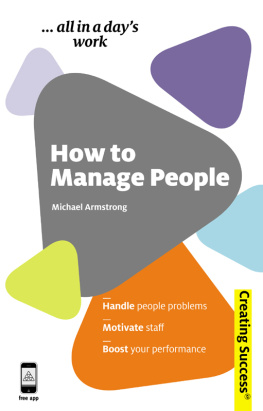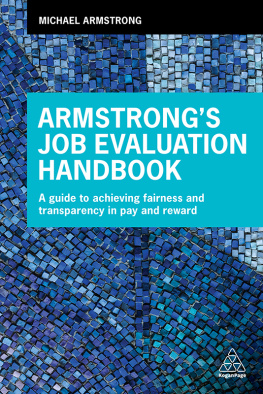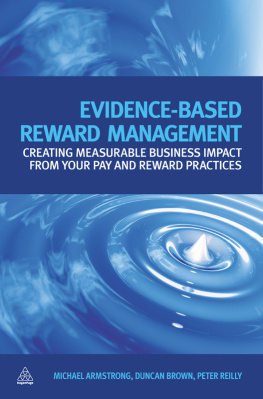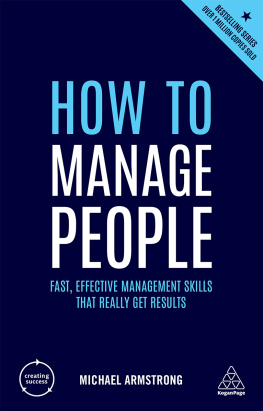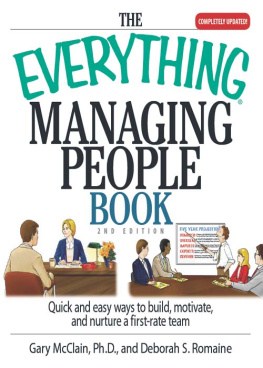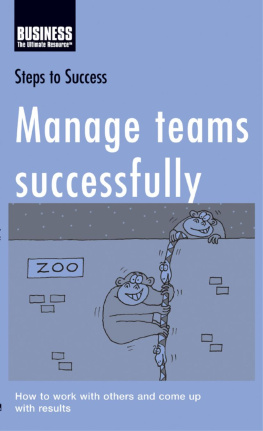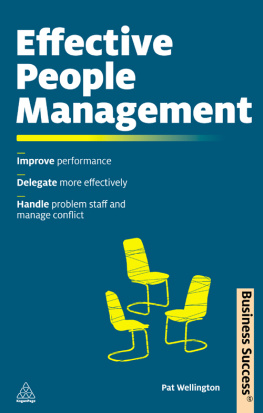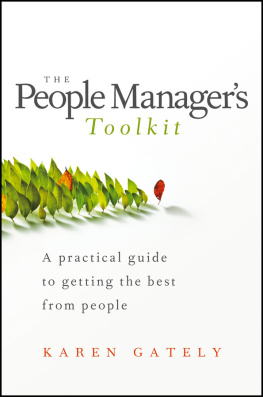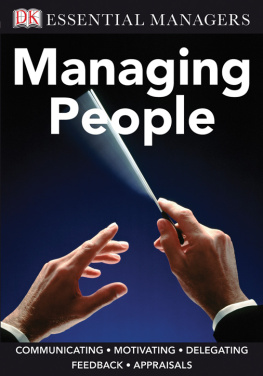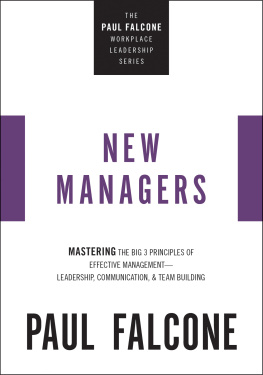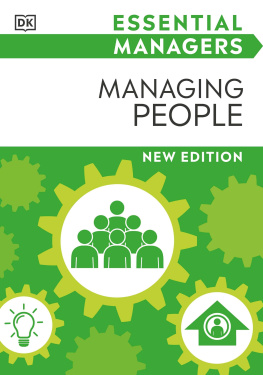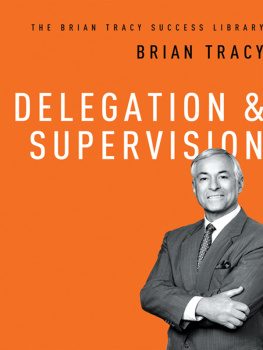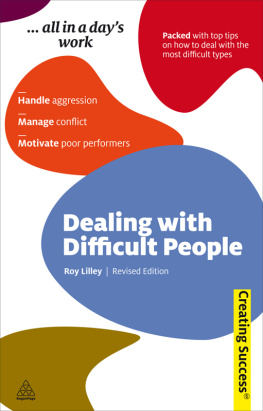How to Manage People
Michael Armstrong

Publishers note
Every possible effort has been made to ensure that the information contained in this book is accurate at the time of going to press, and the publishers and authors cannot accept responsibility for any errors or omissions, however caused. No responsibility for loss or damage occasioned to any person acting, or refraining from action, as a result of the material in this publication can be accepted by the editor, the publisher or the author.
First published in Great Britain and the United States in 2008 by Kogan Page Limited
Reprinted 2009, 2010
Reissued 2011
Apart from any fair dealing for the purposes of research or private study, or criticism or review, as permitted under the Copyright, Designs and Patents Act 1988, this publication may only be reproduced, stored or transmitted, in any form or by any means, with the prior permission in writing of the publishers, or in the case of reprographic reproduction in accordance with the terms and licences issued by the CLA. Enquiries concerning reproduction outside these terms should be sent to the publishers at the undermentioned addresses:
120 Pentonville Road London N1 9JN United Kingdom www.koganpage.com | 525 South 4th Street, #241 Philadelphia PA 19147 USA | 4737/23 Ansari Road Daryaganj New Delhi 110002 India |
Michael Armstrong, 2008, 2011
The right of Michael Armstrong to be identified as the author of this work has been asserted by him in accordance with the Copyright, Designs and Patents Act 1988.
ISBN 978 0 7494 6169 0
E-ISBN 978 0 7494 6164 5
British Library Cataloguing in Publication Data
A CIP record for this book is available from the British Library.
Library of Congress Cataloging-in-Publication Data
Armstrong, Michael, 1928-
How to manage people / Michael Armstrong.
p. cm.
Includes bibliographical references and index.
ISBN 978-0-7494-6169-0 -- ISBN 978-0-7494-6164-5 (ebk) 1. Management--Handbooks, manuals, etc. 2. Leadership--Handbooks, manuals, etc. I. Title.
HD38.15.A765 2011
658.3--dc22
2010024017
Typeset by Jean Cussons Typesetting, Diss, Norfolk
Printed and bound in India by Replika Press Pvt Ltd
eBook by Graphicraft Limited, Hong Kong
Contents
The aim of this book is to give practical advice to managers and team leaders on how to manage people in their teams getting the best results from them and dealing with any people problems that may arise.
It is often said that people leave their managers not their organizations. This may not always be true but there is something in it. So far as many people are concerned their manager is the organization. They do not have much contact with other people in authority. A business may have all sorts of progressive HR policies but it is managers who have to make them work on the ground.
Managers depend on their people. They cannot do without their wholehearted commitment and support. But gaining that support, motivating and engaging them and ensuring that they know what they are expected to do and how to do it is down to managers. And it is a difficult task. This book is designed to make it easier by going into the main actions that managers have to carry out to get things done through people, namely: managing effectively overall, leading, motivating, team building, delegating, interviewing, managing performance, developing and rewarding people, managing change and handling people problems.
The book focuses on what frontline managers, ie those directly controlling teams of people, have to do themselves. Of course, many organizations have HR specialists to give advice and help. But managers have largely to do it themselves. As Professor John Purcell of Warwick University says: Its managers who bring HR policies to life. And many managers have to do their job without HR advice and this book is particularly designed to meet their needs.
As a manager you are there to get things done through people. You are engaged in a purposeful activity involving others. But you are concerned with defining ends as well as gaining them. You decide what to do and then ensure that it gets done with the help of the members of your team. You deal with programmes, processes, events and eventualities. All this is done through the exercise of leadership.
People are the most important resource available to you as a manager. It is through this resource that other resources are managed. However, you are ultimately accountable for the management of all resources, including your own. When dealing with immediate issues, anticipating problems, responding to demands or even a crisis, and developing new ways of doing things, you are personally involved. You manage yourself as well as other people. You cannot delegate everything. You frequently have to rely on your own resources to get things done. These resources include skill, know-how, competencies, time, and reserves of resilience and determination. You will get support, advice and assistance from your own staff and specialists, including HR (human resources), but in the last analysis you are on your own.
The rest of this book examines particular aspects of managing people, such as leadership, organizing and motivation. This chapter focuses more generally on what you need to be and do to exercise your people management responsibilities effectively. It starts with an overall look at the criteria for managerial effectiveness. This is followed by a review of the attributes of effective managers. The rest of the chapter deals with a number of the key aspects of management.
As a manager and a leader you will be judged not only on the results you have achieved but the level of competence you have attained and applied in getting those results. Competence is about knowledge and skills what people need to know and be able to do to carry out their work well.
You will also be judged on how you do your work how you behave in using your knowledge and skills. These are often described as behavioural competencies and can be defined as those aspects of behaviour that lead to effective performance. They refer to the personal characteristics that people bring to their work roles in such areas as leadership, team working, flexibility and communication.
Many organizations have developed competency frameworks which define what they believe to be the key competencies required for success. Such frameworks are used to inform decisions on selection, management development and promotion. Importantly, they can provide the headings under which the performance of managers and other staff is assessed. Managers who want to get on need to know what the framework is and the types of behaviour expected of them in each of the areas it covers.
The following is an example of a competency framework:
- Achievement orientation . The desire to get things done well and the ability to set and meet challenging goals, create own measures of excellence and constantly seek ways of improving performance.
- Business awareness . The capacity continually to identify and explore business opportunities, to understand the business priorities of the organization and constantly to seek methods of ensuring that the organization becomes more business-like.
- Communication . The ability to communicate clearly and persuasively, orally or in writing.

